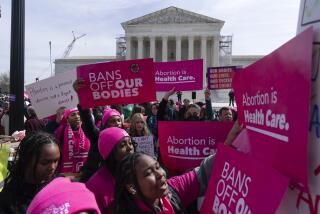Editorial: Hobby Lobby case: Defenders of religious freedom should be careful what they pray for
On Tuesday, the Supreme Court will consider a proposition that will strike many Americans as bizarre: that large, for-profit businesses can refuse on religious grounds to comply with a federal mandate that they include contraception in their employee health plans.
Three companies — Hobby Lobby, a chain of craft stores with 13,000 full-time employees; Mardel, a bookstore chain; and Conestoga Wood Specialties, a cabinet manufacturer — are challenging the mandate. The businesses say it would require them to cover forms of contraception that the owners regard as equivalent to abortion — and thus offensive to their religious faith.
If the court were to accept that mischievous argument, a huge loophole would be created in the Affordable Care Act, which currently requires that employee health plans cover preventive care for women.
But that might not be the only consequence of a wrongheaded decision. American law has traditionally bent over backward to accommodate individuals forced to choose between obeying the law and complying with their beliefs. If that privilege is pushed too far, public support for accommodating religious objections could erode.
Two principal issues will be argued Tuesday: Can a for-profit business claim a religious exemption from the mandate under the 1993 Religious Freedom Restoration Act? And does the requirement that employers provide contraceptive coverage impose a “substantial burden” on their exercise of religion? Under the law, such a burden is permissible only in pursuit of a compelling government interest and only if the law is narrowly tailored.
The first question is easily answered. It isn’t just, as a federal appeals court in Philadelphia pithily put it, that businesses “do not pray, worship, observe sacraments or take other religiously-motivated actions.” It is that business corporations are legal entities distinct from the individuals who create them. As the Obama administration persuasively argues, the owners of Hobby Lobby aren’t entitled to an exemption for their businesses “based on their individual religious beliefs.”
But even if moneymaking corporations were to be viewed as religious believers, the Affordable Care Act’s contraceptive mandate isn’t a substantial burden on their exercise of religion. The mandate doesn’t require an employer to do anything more than make it possible for a female employee to decide for herself whether to use contraceptives.
When the Arizona Legislature passed a “religious freedom” law making it easier for businesses to refuse to serve same-sex couples, a national outcry led Gov. Jan Brewer to veto it. A similar backlash is likely if the Supreme Court approves an absurd expansion of the Religious Freedom Restoration Act. Defenders of religious freedom should be careful what they pray for.
More to Read
A cure for the common opinion
Get thought-provoking perspectives with our weekly newsletter.
You may occasionally receive promotional content from the Los Angeles Times.






